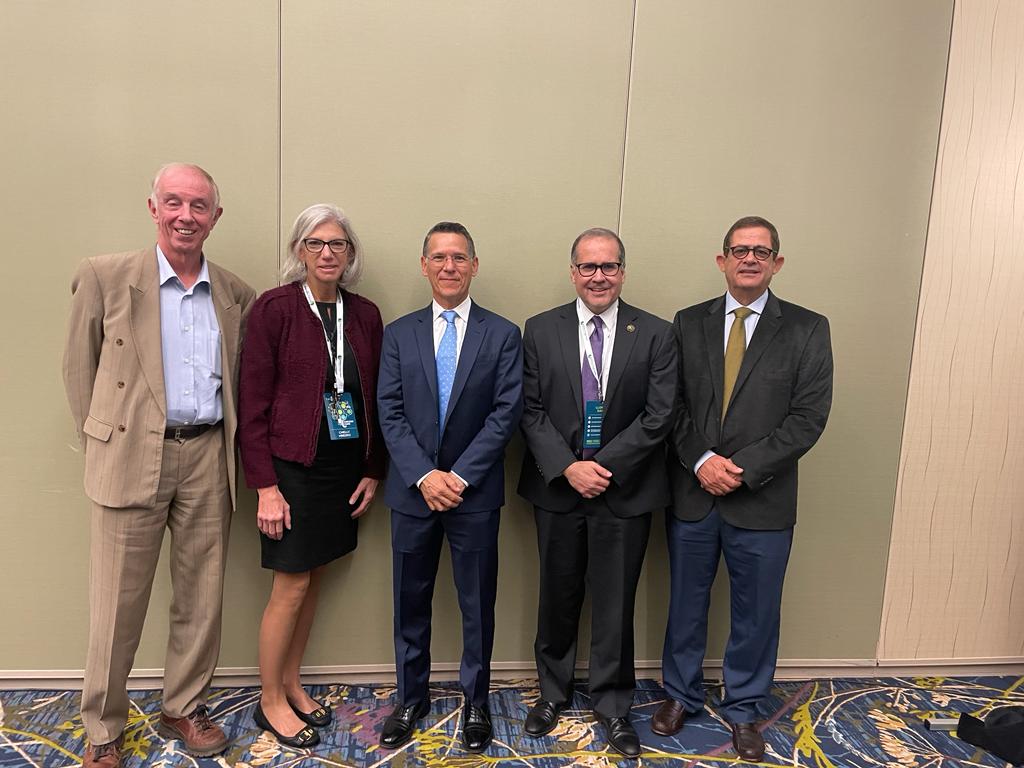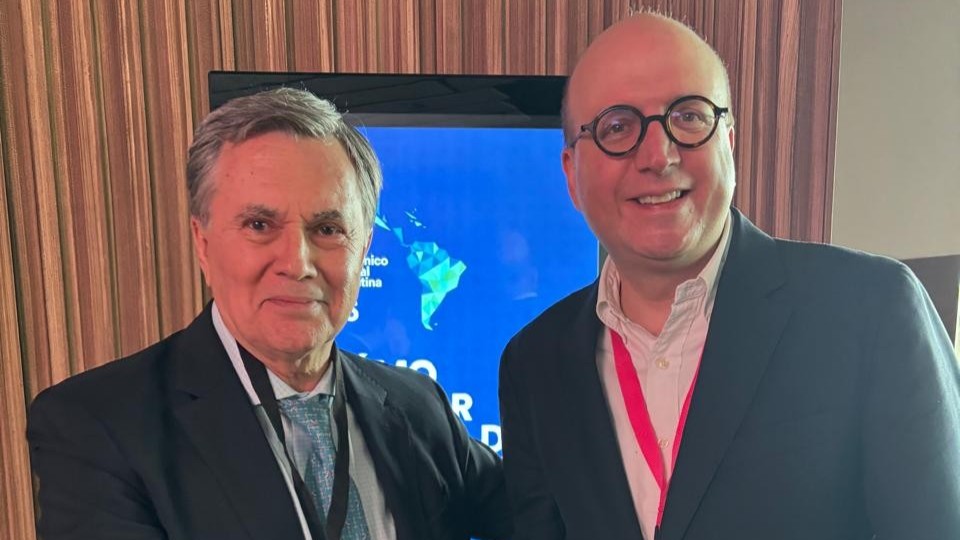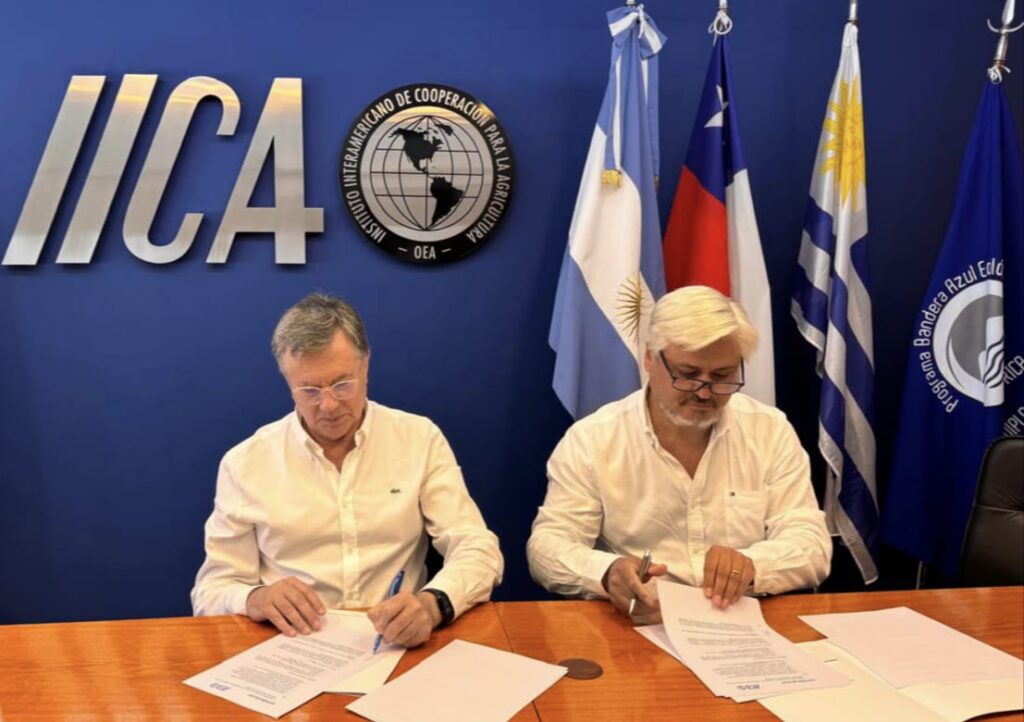A través de la acción colectiva, la ciencia y la innovación están dando pasos relevantes para hacer más resiliente al banano ante la difusión de pestes y enfermedades que ponen en riesgo este cultivo y, por consiguiente, amenazan la seguridad alimentaria global.

Des Moines, Estados Unidos, 26 de octubre de 2023 (IICA) – A través de la acción colectiva, la ciencia y la innovación están dando pasos relevantes para hacer más resiliente al banano ante la difusión de pestes y enfermedades que ponen en riesgo este cultivo y, por consiguiente, amenazan la seguridad alimentaria global.
Así lo explicaron investigadores y representantes del sector privado durante un panel organizado por el Instituto Interamericano de Cooperación para la Agricultura (IICA) en el marco del Diálogo Borlaug 2023.
En el evento participaron protagonistas de la Alianza Global de Lucha contra el Fusarium R4T, en la que trabajan desde 2020 representantes del sector privado, académico, de organizaciones de la sociedad civil, entes estatales y organismos internacionales y en la que el IICA ejerce la secretaría.
La alianza fue constituida con el primer objetivo de contener el avance de esta enfermedad del hongo Fusarium, considerada la “pandemia del banano”, detectada en América Latina en 2019. En el mediano y largo plazo, la misión es investigar y desarrollar soluciones de mejoramiento genético.
El Diálogo Borlaug 2023 se realiza en la casa de la World Prize Foundation (WFP) -en Iowa, Estados Unidos-, prestigiosa institución que promueve la innovación e impulsa acciones para aumentar en forma sostenible la cantidad y calidad de alimentos disponibles. Cada año, la WFP entrega el Premio Mundial de la Alimentación, considerado el Nobel en esta materia, a quienes contribuyen a la seguridad alimentaria y nutricional.
Líderes globales, productores agropecuarios, académicos, científicos, educadores y estudiantes de más de 65 países, entre ellos el Director General del IICA, Manuel Otero, participan en el Diálogo Borlaug, que este año pone el foco en cómo aprovechar la innovación y la diversificación de la producción para mejorar la resiliencia ante el cambio climático, promover la recuperación luego de eventos meteorológicos extremos y alimentar al mundo de manera sostenible.
Crisis y oportunidad
En el debate organizado por el IICA se explicó cómo la crisis por el brote de la cepa raza 4 tropical (R4T) del hongo Fusarium -enfermedad para la que hoy no existe ningún tratamiento, que se transmite a través del suelo y devasta plantaciones- puede ser utilizada como una oportunidad.
Se presentaron, en ese sentido, las acciones que se están llevando adelante para hacer la producción de banano más sostenible, aumentar la producción, mejorar las prácticas de bioseguridad y capacitar a los agricultores, de manera de que sean más resilientes ante amenazas futuras.
Participaron del panel Jorge Sauma, CEO de la Corporación Bananera Nacional de Costa Rica (CORBANA); Chelly Hresko, Gerenta Global de Investigación de Enfermedades de Bayer; Hans Sauter, Vicepresidente Senior de Investigación y Desarrollo de la Compañía de Alimentos Del Monte; y Rony Swennen, productor e investigador del Instituto Internacional de Agricultura Tropical. El evento contó con la moderación de Lloyd Day, Subdirector General del IICA.
Sauma se refirió a la preocupación por el brote de Fusarium R4T que existe en América Latina, ya que la enfermedad fue detectada en tres países de la región: primero en Colombia, luego en Perú y, últimamente, en Venezuela.
“En Costa Rica estamos controlando las fronteras y, en las granjas agrícolas, estamos concientizando a los productores de que hace falta tomar medidas para evitar la contaminación, junto al ministerio de Agricultura y los funcionarios sanitarios”, explicó.
Sauma explicó que en el mundo ya se han hecho grandes avances científicos para encontrar variedades resistentes a esta enfermedad y reveló que CORBANA trabaja en alianza con EMBRAPA, la empresa pública de investigación agropecuaria de Brasil.
“Es muy importante la iniciativa de IICA de la alianza global y la participación de una empresa del peso de Bayer. Tenemos que trabajar juntos para contener la R4T y despejar amenazas futuras, ya que del cultivo del banano dependen millones de agricultores vulnerables, que no tienen otra alternativa”, señaló.
Hans Sauter hizo hincapié en que se trata de un problema que no puede ser abordado en soledad por los agricultores, sino por toda la cadena de suministros y los gobiernos. “Los comerciantes y los consumidores también tienen que involucrarse, porque el banano es un alimento barato, que es uno de los más consumidos en el mundo”, afirmó.
Chelly Hresko afirmó que la enfermedad es una amenaza a la seguridad alimentaria global y que es especialmente riesgosa para los países y las poblaciones más vulnerables. “Entramos a la alianza porque vimos una oportunidad de trabajar a favor de los agricultores y porque podemos ayudar a controlar las enfermedades del banano.”, dijo Hresko.
La experta de Bayer consideró que la edición génica es una herramienta de enorme valor para diseñar variedades que sean resistentes a enfermedades e informó que todos los avances que está realizando Bayer se colocan en una base de datos pública.
Por su lado, Lloyd Day hizo énfasis en que el banano es la fruta más popular del mundo y que en América Latina no solo es una fuente de ingresos irremplazable para agricultores familiares, sino también, un producto de exportación.
“Hay millones de personas –dijo Day- que de alguna manera u otra dependen del banano. La enfermedad R4T destruye los cultivos y afecta los suelos, que luego no pueden utilizarse. Pero sobre todo destruye fuentes de ingresos y economías y significa una seria amenaza a la seguridad alimentaria y nutricional. La Alianza es una plataforma global para coordinar esfuerzos contra las pestes y enfermedades del banano que ya está alcanzando resultados”.
Más información:
Gerencia de Comunicación Institucional
comunicacion.institucional@iica.int










